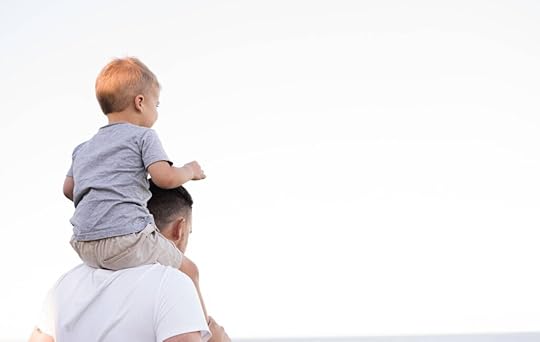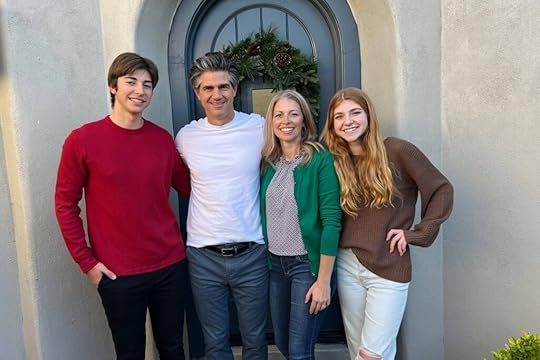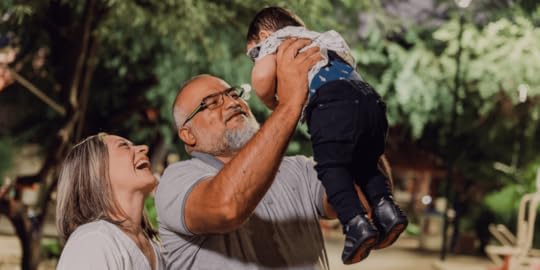Joshua Becker's Blog, page 23
May 31, 2023
The Misconception of Materialism in Creating Happy Families

Advertisements have a way of constantly promising better things. In fact, in both subtle and obvious ways, every advertisement promises we will have a better life if we buy whatever they’re selling. Most advertisements these days don’t even tell you about the product. They sell us something else: a better party… more friends… a better body… a cleaner home…
And often, nestled among these promises is this one: a better family.
Just consider how many advertisements show joyful family scenes with the product or experience at the center—the board game, the vacation, the restaurant, even the new car.
“Buy this product, and your family will be happier.”
This messaging subtly suggests to all of us that the path to family happiness and bliss lies in acquiring more. But, from my perspective, this couldn’t be further from the truth.
As I’ve journeyed towards minimalism over the years, I’ve learned that more is rarely the answer. And less solves more problems than we think.
This sentiment rings equally true when thinking about what our families really need from us.
Consider this, when we fall into the trap of believing that our next purchase or vacation will finally bring our family closer together, we are often led away from the very thing they crave and need most: our time, our attention, and our intentionality.
When we fall into the trap of thinking that buying more will bring true happiness and close relationship bonds to our families, we inevitably end up sacrificing precious time and energy. We pursue the money needed for the purchase that we believe will bring our family closer together—often neglecting the everyday moments of connection and growth that naturally occur within our family lives because of it.
Our children, more than anyone else, are keenly aware of this. Despite what they say, what they yearn for isn’t the latest video game, the next grand vacation, or a pool table in the basement.
What they need, first and foremost, is our time, attention, and conversation. They need parents present in their lives. They need to feel the security and stability that comes from a family where parents are not constantly running the race of accumulation, but are present and engaged with their kids (and spouse).
Of course, providing for our families is crucial, and there is value in hard work and ambition. But a problem arises when the pursuit of material possessions and consumerism begins to overshadow the deepest needs of our family.
But you don’t need to take my word for it, numerous studies have highlighted that what our children need most from us is time and attention. In fact, one study, published just last month, found that “the more time parents spent with children, the higher their children’s well-being will be.” And other research suggests that high consumer debt and the resulting financial stress negatively impact family relationships.
In other words, constantly chasing the next purchase that promises to deliver “the perfect family” may actually be keeping you from it!
We work hard to provide for our families financially.
We must also work hard to provide for their other needs as well. Because more money and more purchases won’t supply all they need.
If our constant desire for the next thing that promises to deliver a happier family is actually pulling us away from our family, it’s time to pause, reflect, and change course.
How do we accomplish this? Well, for one thing, by focusing less energy on what we want to buy next and more on valuing what we already have, we create space for more meaningful connections. We make room for shared experiences, for open conversations, for appreciating the small, everyday moments that, in retrospect, turn out to be the big moments.
As we begin to unburden ourselves from the consumer-driven cycle of seeking more, we’ll find that we have more energy and time to invest in our families.
At the end of the day, our families don’t need more things; they need more of us—our time, our attention, our love, and our presence.
And that’s a promise no product or possession can ever fulfill.
May 28, 2023
15 Years, 15 Lessons: My Journey of Becoming Minimalist

It’s almost unbelievable to me to think that this weekend marks 15 years since that Saturday morning in Vermont when I was first introduced to the word: minimalism.
In a world that continually exclaims “more is better,” the idea of intentionally owning less is countercultural—almost as if the idea must break through the noise. For me, it was a conversation with my neighbor. For others, it was a parent, a friend, or even this blog.
But regardless of how we came to be introduced to minimalism, the lifestyle begins to change us.
These last 15 years have been a journey of learning, understanding, and growth for me.
Whether you’ve been reading Becoming Minimalist all 15 years (thanks mom!) or just started today, I’d like to celebrate by sharing 15 lessons that minimalism has taught me over the last 15 years.
1. The power of less.Our society often equates more with better, encouraging us to amass things in the pursuit of happiness. At the heart of every advertising message is the foundational message that this product will improve our lives.
Maybe the most profound lesson minimalism taught me was the power of less. Having fewer possessions has not only decluttered my physical space, it has allowed me to redirect my precious (and finite) resources toward things that matter.
2. Real wealth is intangible.There is more than one definition of the word wealth. Merriam Webster offers three:
1. abundance of valuable material possessions or resources
2. abundant supply
3. all property that has a money value or an exchangeable value
When most people think of the word wealth, they define it (and usually desire it) in terms of financial or material resources.
But there are other things in the world that we should desire in “abundant supply:” relationships, love, faith, and impact all come to mind.
Very often, the pursuit of material wealth leaves those other pursuits lacking—rather than in abundant supply. Given the choice, I’ll prefer richness in relationships, faith, and love over dollars any day.
Minimalism helped me see that even clearer than before.
3. Contentment cannot be purchased.Society often tells us we’ll be happier if we have more—just turn on the television, open social media, or flip through a magazine.
But the endless pursuit of more only leaves us feeling empty and dissatisfied. Our overly cluttered closets, garages, and storage units stand as visible proof of our ongoing discontent.
Minimalism taught me that true contentment cannot be purchased at a store. You’ll need to find it elsewhere.
4. The richness of giving.In our race to accumulate, we overlook the joy of giving.
Generosity is something we desire to be true of ourselves—of course. But when 80% of us believe we’ll be happier if we have more money, the richness found in giving is rarely considered as a source of lasting happiness.
But there is a different way. And over the years of pursuing minimalism, I have learned that generosity is not just the byproduct of minimalism—it can also be the very lifeblood of it.
It’s a form of wealth that enriches not just the receiver but the giver too.
5. Comparison is the thief of joy.Comparison seems to be built into the human spirit.
And one thing I have learned over 15 years is that if we’re not comparing our physical possessions to our neighbor, we’ll find something else to compare. Minimalism does not remove the tendency automatically.
However, minimalism allows me to compare one less thing to everybody else. And slowly, but subtly, I learn to cooperate and cheer, rather than compare.
6. Minimalism is a lifelong journey.Decluttering isn’t a one-time activity but a constant process of evaluating what adds value and purpose to our lives.
15 years ago, I named this blog, Becoming Minimalist. And I couldn’t be happier with the name choice. In fact, I rarely (if ever) call myself a minimalist. Even 15 years later, I prefer to use the phrase “becoming minimalist.” Because consumerism doesn’t go away, and neither does life change.
Next year my daughter will graduate high school and my wife and I will become empty nesters (or at least that’s how it looks today). At that point, we will need to re-evaluate again, what is our greatest purpose during this season of life? What possessions do we need to accomplish that purpose? And what has become only a distraction?
Minimalism is a lifelong journey of making conscious decisions that align with our values.
7. Intentionality is a key to joy.At its core, minimalism is about intentionality.
It’s about aligning our life resources with our greatest values—and removing any distraction that keeps us from them.
And I have found that the greatest, longest-lasting joy is found living in alignment.
Minimalism, essentially, is about choosing what to let in and what to let go, what to do and what not to do, what to pursue and what to release.
8. Minimalism sparks spiritual growth.My personal faith has formed a rich foundation for how I think about minimalism and how I pursue it.
Equally so, minimalism has brought greater depth and understanding to my personal faith. And that was an unexpected surprise to me.
Faith is not a topic I speak about in great specificity here on Becoming Minimalist, there are other places where I do that.
But if you would like to know more, I go into greater detail in my book The More of Less, and even started a weekly faith-based email earlier this year called Focus on Faith. You can sign up here to receive it for free.
9. Our identity is not defined by what we own.We live in a world that often defines us by what we own. But our possessions are just things; they don’t reflect our identity or worth. And sometimes those with the most possessions have sacrificed their very identity for it.
So, we should be careful to not measure success in life by material possessions. As the old proverb goes, “A rich heart may be under a poor coat.”
10. Our kids are watching us more than we think.Over the last 15 years, I have spoken all around the world on the pursuit of minimalism. And no matter where I am, I am met with a similar question, “How do I keep my kids from envy and materialism?”
And my answer is always the same, “You need to keep yourself from envy and materialism. If you have a closet full of things you don’t need, you will have a hard time explaining to your child the foolishness of buying things you don’t need.”
If we want to raise children who are not consumeristic, we must model it for them.
11. Minimalism forces clarity.The process of minimizing our possessions requires more than physical effort deciding what can be parted with. It requires mental effort identifying what we need to keep.
You can’t decide what to get rid of until you know what you need. And it’s hard to know what you need until you know what you are trying to accomplish with your life.
Minimalism forces questions of values upon you. Of course, it also provides the clarity and space to answer them.
12. Money can be spent on better things than material possessions.Our money is only as valuable as what we choose to spend it on. When we choose material goods, like a big-screen TV or a new wardrobe, that’s the value we’ve gained—fleeting amusement or ever-changing fashion.
But let’s consider a different approach. What if we chose to spend that money on shared experiences, like a family vacation? The value of our money then extends beyond the physical.
Along those same lines, what if we directed those same resources to solve problems and effect change in the world? To provide a family for an orphaned child or clean water to a village? Suddenly, the value of our money is multiplied many times over!
The true worth of our money lies not in what we can buy for ourselves, but in the difference we can make in the lives of others. There are always better things to spend our money on than material possessions.
13. Minimalism is personal.Minimalism doesn’t adhere to a “one size fits all” approach. It will look different for all of us—depending on where we live, our family, our career, our hobbies, even the problems we want to solve in the world.
There is great freedom to be found in this lesson. And almost everyone who decides to pursue a minimalist life learns this quickly.
14. Selfless work is often the most meaningful.Through minimalism, I’ve discovered a new perspective on work.
When we choose to live with less, fewer financial resources are required. And we can begin to think about work differently. Rather than the means to an ever-growing paycheck, work can become a way to pour our heart into the world.
In needing less, we can focus more on contributing to the people around us and less on working for personal gain. As we do this, we find our work becoming a source of joy and satisfaction, not just an opportunity to acquire more and more for ourselves.
This shift, while seemingly counterintuitive in our consumeristic society, brings deeper fulfillment and purpose.
15. The world needs minimalism.Embrace minimalism—it’s a gift waiting to be unwrapped. This philosophy is not confined to specific personalities, circumstances, or economic status. It’s an opportunity for intentionality, giving freedom to focus on what truly matters.
Through minimalism, we realize our greatest potential.
Minimalism isn’t about having less—it’s about making room for more purpose, more clarity, more fulfillment.
The world hungers for this transformation. Jump while you can. Minimalism is a call to elevate our lives, enriching our spaces and our spirits.
—
Reflecting on these 15 years, I’m immensely grateful for the journey minimalism has led me on.
But I am equally grateful for you—the Becoming Minimalist Community. Your many kind comments, emails, and support have allowed me to play this role in the world—encouraging all of us to own less and live more.
I hope during the next 15 years I will continue to grow and be challenged—and I wish the same for you.
May 26, 2023
10 Ways Minimalism Will Help You Be Less Busy

“Beware the barrenness of a busy life.” —Socrates
Recently, the New York Times labeled the modern family the most stressed, tired, and rushed generation of all time. Few of us would disagree.
It is not lost on me that one of the reasons this might be true is because our modern generation owns more stuff than at any other time in human history. As material goods have become more accessible and more affordable, we have accumulated more and more.
Additionally, as the pace of life has increased, so has the expectation that being busy is something to be proud of. We often complain about how busy life has become… but we are always sure to complain loud enough that everyone can hear us. As if, being busy has become a badge of honor we love to wear.
But does this endless chase ever bring true fulfillment? Doubtful.
As Socrates said, beware the barrenness of a busy life.
Minimalism offers a different perspective and approach to living life well.
Here are 10 ways adopting a minimalist lifestyle can help you be less busy:
1. Less Shopping
When we break free from the consumer culture that urges us to buy, buy, buy, we inevitably spend less time in stores and online marketplaces.
Minimalism teaches us to prioritize needs over wants, which results in fewer shopping trips (and less time researching and returning products).
2. Fewer Distractions
By minimizing physical clutter, we remove distractions from our work and living spaces.
This increased opportunity for focus can lead to greater productivity, allowing us to accomplish tasks more efficiently and freeing up time.
3. More Efficient Wardrobe
Having a minimalist wardrobe means less time spent deciding what to wear every day.
It also means less time doing laundry, shopping for clothes, and organizing your closet.
There’s a reason many successful people are adopting the idea.
4. Less Cleaning and Organizing
A minimalist home requires less upkeep. And with fewer items to clean, maintain, and organize, we are rewarded with more time in our day.
Want a cleaner home? Own less stuff. It works every time.
5. The Ripple Effect of Intentionality
Embracing minimalism in one aspect of our lives tends to have a ripple effect that spills over into other areas like our calendar, our habits, and even the work that we do.
Intentionality sparks intentionality.
6. Clearer Values
Minimalism forces us to articulate and prioritize our greatest values.
When we understand what truly matters to us, we make better decisions about how we spend our time. We can say no to activities that don’t align with these values and free up hours for the ones that do.
7. A New Appreciation for Quiet Moments
As we become more comfortable with the idea of ‘less,’ we start cherishing quiet moments.
Instead of feeling the need to fill every minute with activity, we learn to appreciate the peace found in simple, quiet moments. And these quiet moments of solitude both feed our soul and direct our path.
8. Less Financial Stress
With fewer possessions and fewer purchases, minimalism offers opportunity to experience less financial stress.
And fewer financial worries mean less time consumed by anxiety, budgeting, bill paying, and sometimes arguing.
9. Less Decision Fatigue
Each day, we make numerous decisions—what to wear, what to eat, how we entertain ourselves, what chores or errands to complete.
Owning less and simplifying our routines can reduce the number of these daily decisions, saving us mental energy and time—and in the long run, leading to better decisions.
10. Life Lived in Alignment
With less clutter, we are free to focus on what matters most to us. Our most finite resources (money, time, energy, focus) can be spent on our greatest values.
And when they are, life gets less “busy.” There are still wonderfully important things for us to accomplish—but alignment doesn’t feel like busyness; it feels like purpose.
As always, minimalism is a personal journey and will look different from person to person.
But in a world of increased stress, rush, and hurry… a little less busyness can be appreciated by everyone. Minimalism makes that possible.
May 24, 2023
We Are Defined by the Things We Don’t Do
Editor’s Note: This is a guest post from Brian Gardner.

In today’s society, accomplishments and possessions are often heralded as the ultimate markers of success. As a result, we are taught to chase our dreams relentlessly, acquire more, and constantly strive for personal betterment.
However, I have come to understand that the choices we make to abstain, refuse, or resist specific actions or possessions can be just as revealing of our character and lead us down a path of personal growth.
In my journey towards embracing minimalism, I have discovered that the things I have chosen not to do have genuinely defined me as a person.
1. Embracing Simplicity by Letting Go of PossessionsChoosing not to acquire more possessions has transformed my understanding of what brings true happiness and contentment. Like many, I once believed that accumulating material wealth and possessions was the key to fulfillment.
Yet, as I stepped back and assessed the clutter in my life, I realized that these belongings did not provide the joy I had anticipated; instead, they were weighing me down physically and emotionally.
In consciously deciding not to accumulate more possessions, I redirected my focus toward the aspects of life that genuinely bring satisfaction: nurturing relationships, engaging in memorable experiences, and fostering personal growth.
This decision to abstain from consumerism has not only lightened my load but also given me a newfound appreciation for the beauty of simplicity.
2. Living Authentically by Rejecting Social CompetitionOpting not to engage in the relentless pursuit of social comparison and status has allowed me to carve out a more authentic and meaningful life.
Society often instills in us the need to compare ourselves to others, pushing us to climb the ladder of success and outshine our peers. But, unfortunately, this constant striving for superiority can lead to a life that is neither fulfilling nor genuine.
By stepping back from this competitive arena, I have discovered my true passions and pursuits, free from the pressures to conform to societal expectations. This decision not to participate in the race for social validation has enabled me to live on my terms, fostering greater self-awareness and personal satisfaction.
3. Finding Presence by Resisting Constant ProductivityResisting the constant urge to be productive has granted me the freedom to savor life’s moments. Unfortunately, in our fast-paced world, it is easy to fall into the trap of equating busyness with worthiness. We rush from one task to the next, hardly taking a moment to breathe, let alone truly enjoy the present.
When I decided to avoid filling every moment with activity, I discovered the elegance of stillness and developed a deeper appreciation for the world surrounding me. This choice to resist the compulsion for constant productivity has given me the gift of presence and a deeper connection to myself and others.
The road less traveled represents more than just an unexplored path in our lives; it is crucial in shaping our identity and guiding our personal evolution. Embracing the importance of what we choose not to do allows us to reshape our priorities, values, and self-perception, ultimately guiding us toward a more authentic and rewarding life.
4. Nurturing Relationships by Disconnecting from TechnologyNot being constantly connected to technology has allowed me to strengthen and deepen my relationships. In an age where social media and digital communication dominate our interactions, it is easy to become detached from the people around us, even when they are physically present. We can become consumed by our virtual worlds, missing out on the opportunity to create genuine connections.
By consciously disconnecting from technology and being present with my friends and family, I have forged stronger bonds and genuinely appreciate the value of these relationships.
In addition, this choice to step back from the digital realm has enriched my life, filling it with meaningful conversations, shared experiences, and deeper connections with those I care about.
5. Cultivating Gratitude by Directing my Focus Away from Material AbundanceOpting not to emphasize material wealth has allowed me to cultivate a deep gratitude for the non-material abundance in my life. By shifting my focus from what I don’t have to what I do have, I have discovered a wealth of joy and fulfillment in the intangible aspects of life: love, kindness, friendship, and personal growth.
Recognizing the value of these non-material treasures has fostered a profound appreciation for the simple yet profound riches surrounding me.
Embracing gratitude for the non-material aspects of life has allowed me to open my heart to the inherent beauty and abundance present in our experiences, fostering contentment in the simple pleasures and everyday moments that shape my existence. This conscious decision to focus on the intangible aspects of life has contributed to my overall happiness and well-being.
My journey toward minimalism has taught me that we are defined by what we don’t do. Opting against accumulating more possessions, engaging in competition, constantly pursuing productivity, remaining tethered to technology, or prioritizing material wealth, I have fostered a more straightforward and meaningful life.
I hope others also find inspiration in this philosophy, discovering that the path to true contentment lies not in what we do or accumulate but in our choices to abstain, refuse, or resist.
Thus, as we embark on our unique journeys through life, we must recognize that the most transformative and meaningful experiences of personal growth often arise from the unoccupied spaces we deliberately leave untouched.
***
Brian Gardner is a freelance web designer and the founder of No Sidebar, where his vision has inspired thousands to embrace a minimalist lifestyle and experience the transformative power of simplicity.
May 21, 2023
Embracing the Freedom of No

“Half of the troubles of this life can be traced to saying yes too quickly and not saying no soon enough.” —Josh Billings
How often do you use the word “no?” If you’re like most people, it’s probably not enough.
We live in a world that seems to glorify the word “yes”—seize every opportunity, keep every door open, spend every dollar, stay constantly busy.
But in our pursuit of more, we often lose sight of what’s truly important. Filling our lives with a million yeses often leaves us empty.
One thing I’ve learned over the years of pursuing minimalism is that the word “no” is not a rejection, it’s a choice.
In fact, it’s one of the most empowering words in the English language. By saying “no,” we take control of our own lives and free up space for what truly matters.
Kelvin Wong, Economics Professor at ASU, once wrote in Simple Money Magazine something I have never forgotten, “Every choice we make comes with a cost, even those that are monetarily free, since even our time or energy can be put to alternative uses.” I couldn’t agree more.
Every choice we make has an opportunity cost, and the currency we’re trading is not just our money—it’s our time, energy, and attention.
For example, when we say “no” to impulse purchases, we are saying “yes” to financial health and the peace of mind that comes with it.
When we refuse to jam-pack our calendar with non-essential commitments, we are saying “yes” to quality time with loved ones, or quiet moments of meditation and solitude that can nourish our soul.
When we decline unnecessary responsibilities, even if they seem like noble causes, we make room for work that aligns more closely with our truest purposes and passions.
This temptation to over-commit ourselves and our resources comes from both external and internal sources.
We live in a world that tempts us to always add more: more clothes, more gadgets, more social events, more obligations, more side hustle opportunities.
But studies have also shown that our tendency as humans, when faced with a problem, is to look for solutions that add elements to our lives rather than subtracting them. In the process, we risk overcomplicating our lives.
Here’s a fresh perspective: what if, instead of adding, we started subtracting? What if we embrace the power of “no” more often?
Saying “no” is not about shutting doors or missing out. It’s about making conscious decisions about what we truly value in life. It’s about freeing ourselves from clutter, distractions, and the weight of unnecessary burdens.
Next time you find yourself on the verge of saying “yes” to another commitment or purchase, ask yourself, “Is this adding genuine value to my life, or is it merely another distraction? If I say ‘no’ to this, can I create more room for things that truly matter?”
Remember, each “no” is also a “yes” to something else, something potentially more meaningful. It may be a “yes” to your own well-being, personal growth, financial freedom, or the pursuit of a life well-lived.
Minimalism, after all, isn’t about the absence of something. It’s about the presence of the right things—the ones that add real worth to our lives.
And often, it starts by saying one small word: “no.” And that is why it may just be one of the most empowering words in the English language.
Give it a try. You might be surprised by the freedom and clarity it brings.
May 19, 2023
Inspiring Simplicity. Weekend Reads.

Embrace the freedom that comes from less.
Minimalism isn’t just about owning fewer possessions. It’s also about an intentional promotion of our highest values in life by removing anything that distracts us from them. It’s about finding the freedom to live the life we’ve always dreamed of.
As we journey together toward an intentional and minimalist lifestyle, it’s helpful to find constant inspiration for motivation.
So, make yourself comfortable with a hot cup of tea or coffee this weekend, and take some time to read and reflect on these personally curated articles that are here to inspire simplicity and intentionality in your life.
6 Things to Let Go of to Slow Down Time | Rich in What Matters by Julia Ubbenga. Decelerating the speed of your life has a slowing effect on time. But to optimize the deceleration, you also have to let go.
Mother Only Wears One Outfit | Washington County Daily News by Mary Haynor. “My mom wears the same thing every day for weeks. I wonder what the issue is. What do I do to get her to wear something different?”
How to Declutter Your Digital Life: 9 Practical Tips | No Sidebar. In today’s fast-paced world, digital clutter can be just as overwhelming as physical clutter. Here are 9 helpful tips to take back control.
Spending Time or Stealing Time: What Do You Want to Do Now? | Psychology Today by Carrie J. Knowles. Reframing your thinking can change how you live.
Recently Released Inspiring Videos21 Things To Do In the Morning Before Checking Your Phone | YouTube by Joshua Becker. If you want to break the habit of checking your phone first thing in the morning, here’s a list of 21 things you could do instead.
12 Simple Decisions to Make Today Better than Yesterday | YouTube by Joshua Becker. What should we expect from today? It’s tough to know for sure. But in some regards, that is more up to us than we think.
Other ResourcesPrequel. Are you a parent who wants your child to succeed in school and life? I’m sure you are. Prequel is a free email newsletter that my wife has been reading for months. It contains valuable ideas, resources, and prompts for parenting well. Since we’ve been enjoying it so much, I thought it would be helpful for me to mention it here.
May 17, 2023
Money and Impressions: A Fool’s Game

In a society that is quick to measure worth by the number of zeroes in a bank account, it is easy to get swept into the temptation of displaying our financial well-being—hoping to impress others with how much we can afford.
This isn’t new. Conspicuous consumption was a phrase first used in 1899 to explain “the spending of money on and the acquiring of luxury commodities specifically as a public display of economic power.”
But trying to impress others with our wealth is an empty and foolish game. It is wise for us to remind ourselves of that fact often and steer our decisions away from it.
The desire to impress others can deeply influence our choices—the cars we drive, the clothes we wear, the neighborhood we live in, the vacations we take, even the jobs we pursue. But the momentary admiration that these material possessions bring is short and temporary.
Before we know it, our car gets dented, fashion trends change, or our phone is out-of-date. Those once impressive possessions no longer turn heads. And we find ourselves trapped in a cycle of buying, displaying… and having to restart again.
There’s always going to be someone richer, someone with a bigger house, or someone with a more luxurious car. Trying to impress others with our financial means and purchases is a game with no finish line.
And all of this occurs at the expense of our happiness—and often, our financial health as well.
When we use money as a marker of success, we quickly lose sight of what truly matters.
Besides, one person’s wealth doesn’t make them inherently more successful than someone else. There are too many other factors in play—beginning with where we started in life.
The self-made millionaire might be celebrated, but what about the person who rose from abject poverty to a life of stability? Or what about the man or woman who could have been a millionaire, but gave away their money to the poor? Their journey might not be as glamorous, but it is probably more remarkable—even though they will likely never be featured on a magazine cover.
Some of the most impressive people I’ve ever met had few dollars to their name.
Success in life is not measured by the dollars in a bank account. It’s measured by the love we share, the selfless approach we take to life, the obstacles we overcome, the progress we make, the legacy we leave, and the lives we touch.
There are greater memories that we can leave than the number of things we were able to buy.
I have been told by some people, “I don’t care if I leave a legacy. I’m not trying to leave an impression on others.”
I usually reply, “But you don’t have a choice. You will always be remembered by someone. The only question is, ‘What will they remember you for? Will you leave them with positive memories or negative ones?”
It is wise for all of us to reflect on our legacy and the inheritance we leave behind. And I’m not talking about financial wealth, but the example we set, the lives we touched, and the difference we made.
Imagine using our wealth to break the cycle of poverty for a child, provide medical aid to the sick, or solve any of the problems in the world you are passionate about solving. Each of those decisions may result in less wealth to showcase with your purchases, but they all bring about more good in the world and fulfillment in our lives. These actions increase the value of our money far beyond any material purchase ever could.
Whenever we are tempted to buy something just for the purpose of impressing others, we should pause and ask, “Why?” Usually the motive isn’t healthy… and neither is the result.
In the long run, it is our actions, not our assets, that leave the greatest impression.
May 14, 2023
The Power Of One: How 1 Dollar Can Change A Life

I talk often about the many lessons I’ve learned through my journey into the world of minimalism.
I’ve learned the value of contentment—being satisfied with what I have, rather than constantly seeking more.
I’ve learned to see the beauty in simplicity—not only in owning fewer possessions but also in simplifying my schedule and freeing up time to spend with loved ones.
I’ve learned how to focus on living a meaningful life—focusing on things that matter.
And over the years, I’ve learned the power of one. For example:
One compassionate word can brighten someone’s day.
One random act of kindness can start a chain reaction that touches many lives.
One small step forward can lead to major changes.
And I’ve also seen that one community of remarkable people can spark a movement that is changing the world. And incredibly, one dollar a day can change the life of a child.
Let me introduce you to The Hope Effect.
The Hope Effect
In 2015, with tremendous support from this community, we launched The Hope Effect, a nonprofit organization seeking to change the way the world cares for orphans.
It’s a big goal, and an important one.
You see, millions of children around the world are growing up without parents. In many developing countries, orphans are raised in institutions—or what we commonly refer to as orphanages.
In an institutional environment, a large number of children are cared for by a rotating staff of employees.
Unfortunately, research has told us for decades that institutional care has extremely damaging long-term effects on children.
When children grow up in orphanages, they don’t receive the love, support and individual attention found within a family environment. As a result, children often have delays in every area of their development. And sadly, many children age out of orphanages only to face a future of crime, prostitution, or trafficking.
There must be a better way to care for orphaned and vulnerable children. And there is!
The research is clear. Every child deserves a family.
That’s why The Hope Effect is working to change the way the world cares for orphans by providing loving family care around the world.
Since announcing our nonprofit in 2015, the Becoming Minimalist community has rallied together toward this amazing cause.
Currently, we’re pioneering and expanding family care across the globe in several locations in Latin America and Southeast Asia. In fact, just last month we announced our newest location, Nuevo León, Mexico. More and more children around the world are getting out of orphanages and into stable, supportive families.
Through the love of a family, children like Lucas* have hope for a brighter future.
Lucas’ StoryLucas was removed from his mother’s care immediately after he was born. After his initial stay in the hospital, Lucas was placed into an orphanage in Sonora, Mexico, where he spent the first few months of his life.
While the staff at the orphanage provided the best care they possibly could, an orphanage is no substitute for a family. During a time when Lucas should have been learning, growing, and bonding with his family, he was simply surviving.
Thankfully, our team in Sonora was able place Lucas into family care when he was eight months old. And in a loving family environment, he began to thrive. Lucas quickly reached new physical and emotional milestones, even overcoming some developmental delays within the first few weeks.
But don’t just take my word for it. Watch this short video to see just how loved this little boy is and how his life has been forever changed:
Give Hope For One Dollar A DayIncredibly, just one dollar a day is all it takes to change the life of a child like Lucas. One dollar a day helps get a child out of an orphanage and into a loving family. One dollar a day gives a child hope for the future.
May is National Foster Care Month, and I’d love for you to partner with us in this important work by joining our Dollar A Day Team. Your generosity and support can make a difference in the lives of children around the world.
And if you join this month, we’ll double the impact of your gift for an entire year. In honor of National Foster Care Month, one of our supporters has generously offered to match the donations of the first 50 people who join the team… for the entire first year!
The Hope Effect is a 501(c)(3) organization, so your donation is tax-deductible within the U.S.
And we know you want your donation to be used for the reason it was given, so you can choose to direct 100% of your gift for orphan care work.
Every dollar you give will be used directly to help orphaned and vulnerable children find loving families. That was my commitment when we started The Hope Effect, and it remains my commitment today.
Thank you so much for supporting the vision of The Hope Effect over the last several years. It has been an amazing journey
Together, we are changing the way the world cares for orphans… because every child deserves a family.
*The child’s name has been changed to protect his privacy.
May 12, 2023
10 Signs You Own Too Much Stuff

The story we are told, from almost the moment we are born, is that “more is better.” More money, more gadgets, more clothes, more house, more toys.
But the reality is, all this “more” often leaves us with less—less fulfillment, less freedom, and less peace.
The stuff we accumulate affects us in countless ways. It influences the rest we find at home and the role we get to play in the world.
But in a world where consumerism seems to progress unchecked and is even promoted by many of our leaders and mentors, how can we know when we have given in? How can we know, on a personal level, when we own too much stuff?
To help, here are 10 signs you might own too much stuff.
1. You are unable to park in your garage.
This is a common occurrence for many families. In fact, some studies show that 75% of American households can’t hold the full amount of cars they are designed for because of storage.
The garage, intended originally as safe shelter for vehicles, has become a storage unit for things we don’t use or don’t even remember we own. If you’re constantly shifting stuff around to make room or parking outside because there’s no space, you probably own too much stuff.
2. Rooms are left untidy at the end of the day.
An untidy room might seem normal, especially if you have children. But if every room is constantly messy and you find it challenging to tidy up at the end of each day, it’s time to consider whether you have too many items in your house.
If you want to test this out, try a before-bed evening routine. If it’s too much to handle, even after embracing an intentional approach to it, you probably own too much stuff.
3. You can’t figure out where all the money is going.
Stuff costs money. The more we buy, the more we spend. If you find yourself wondering where your money is going each month, take a look around. The answer might be sitting on your shelves, in your closets, or packed away in your garage.
We waste more money than we think on nonessential purchases.
4. It takes longer to clean your house than you think it should.
Cleaning is a necessary part of maintaining a home. However, if you find that it’s taking up an inordinate amount of your time, it might be because you have too many things to clean, organize, and maintain.
I’m not saying you’ll fall in love with cleaning. But if you constantly finish up thinking, “I can’t believe this took so long,” you probably own too much stuff.
5. Your children consistently presume you’re going to buy them stuff.
Our actions teach our children about life and priorities. If your kids constantly expect new toys, clothes, or gadgets, it might be a sign that the value of possessions has been overemphasized in your household.
Sorry to sound harsh, but it’s always wise to look inward first to see how well we’re modeling contentment.
6. You feel stressed in your own home.
Your home should be a sanctuary, a place where you can relax and recharge. But if you feel stressed or anxious every time you look around, it might be because the clutter is overwhelming you.
7. You’re constantly organizing and reorganizing.
Organization can only go so far. If you find that no matter how much you organize, things never seem to have a permanent place, it could be a sign that you simply have too much stuff.
As Courtney Carver once said, “If you have to buy stuff to store your stuff, you might have too much stuff.”
8. You don’t use a significant amount of the stuff in your home.
It’s natural that we don’t use every single item in our homes daily. However, if a substantial percentage of your belongings gather dust and are rarely or never used, it’s an indicator that you own too much stuff.
Unused items not only consume physical space but also mental space as they add to the clutter around us and contribute to a sense of disorganization. Remember, the goal is to fill your home with items that serve a purpose and add value to your life, not items that sit idle.
9. You’ve ever said to yourself “I really need to declutter” but haven’t taken action.
If you’ve ever found yourself saying, “I really need to declutter,” but then did nothing about it, consider this a clear sign you own too much stuff.
The reality is that objects never declutter themselves. On the contrary, we tend to accumulate more over time. Inaction only allows the clutter to grow—making the task of decluttering appear even more daunting.
Remember, decluttering is a process, not a one-time event. Start small and start now – your future self will thank you.
10. You often lose items and spend valuable time looking for them.
In a cluttered home, things get lost. And looking for lost items can be a frustrating and time-consuming task. If this is a recurring scenario in your house, you likely have too much stuff.
Recognizing these signs is the first step towards a minimalist lifestyle.
Owning less stuff means more freedom, more space, and more peace. It allows us to live our lives more intentionally and focused on what truly matters.
It’s not always an easy journey, but it’s one that is undoubtedly rewarding.
Remember, the goal isn’t to live with nothing, but to make room for everything that truly enriches your life.
May 10, 2023
Re-Centering Yourself: 5 Steps to a Balanced Life
Note: This is a guest post from Angela G. Horn of Mostly Mindful.

January was Get A Balanced Life Month.
Can you even remember that far back? More to the point, why am I pointing this out when it’s already May?
Well, we’re more than a third of the way into 2023. So I figured now would be the perfect time to see how things are going. Let’s start with a question.
How balanced is your life right now?
Here’s the thing. There’s a lot you can do to get organized at the outset of the new year. Decluttering, cleaning up your inbox, getting your admin in order, and so on.
But unlike the examples listed above, balance isn’t a box you check off on your to-do list and then move on with your day. Between work, family, friends, and health, it can often feel as if life is a never-ending juggle.
Most of us are never going to reach a point where all areas of our lives are in perfect harmony. And that’s okay. You can’t expect to give the same amount of effort to everything.
Depending on what you have going on, one area will always need more attention than the rest.
A big project at work means extra hours at the office. A health setback makes self-care a priority. Small children or elderly parents will have family taking precedence.
That’s how life is. Things happen. If you haven’t laid the groundwork for balance, your life will feel like an endless game of Whack-a-Mole.
Let’s agree to make 2023 the year that stops happening. I’ll get to the steps to a balanced further down, but first, a quick primer on Stephen Covey’s four-quadrant time management system.
The Four Quadrants: Where to Focus Your AttentionStephen Covey’s four quadrants is a time management concept that helps individuals prioritize their activities based on urgency and importance. The concept is outlined in more detail in his book The 7 Habits of Highly Effective People.
The four quadrants are:
Quadrant 1 (Urgent and Important): Activities that are both urgent and important. These are tasks that require immediate attention, such as emergencies or impending deadlines.Quadrant 2 (Not Urgent but Important): Activities that are important but not urgent. These are tasks that contribute to long-term goals and success but may not have a specific deadline or immediate consequences.Quadrant 3 (Urgent but Not Important): Activities that are urgent but not important. These are tasks that may be time-sensitive but do not contribute significantly to long-term goals or success.Quadrant 4 (Not Urgent and Not Important): Activities that are neither urgent nor important. These are tasks that do not contribute to long-term goals and are often time-wasting activities, such as scrolling through social media, watching TV, or getting stuck in the latest news cycle.Covey suggests that individuals should focus on Quadrant 2 activities to achieve their long-term goals and minimize Quadrant 1 activities through effective planning and organization. Quadrant 3 and 4 activities should be minimized or eliminated as they do not contribute significantly to personal success.
5 Steps to a More Balanced LifeThe aim of these five steps is to help you minimize stress and maximize wellbeing. By dialing those down and up respectively, you’ll be better positioned to achieve and maintain a sense of equilibrium in your life. And in doing so, free yourself up to focus on the things that are important.
Implementing the suggestions below won’t make all your days zen perfect, but they’re sure to be a huge improvement on your previous status quo. Sayonara Whack-a-Mole. Hello, balance.
1. Figure Out Your #1 Self-Care HabitWhen life gets busy, taking care of yourself is often the first thing to suffer. Between deadlines at work, raising kids, and being active in your community, finding time for you can be tough.
Michelle Segar, a leading researcher in the science of sustainable health behaviors, says one of the most important things we can do is identify our #1 self-care habit. That one thing that keeps us energized, plugged in, and ready to rock.
For her, it’s sleep. For her husband, it’s exercise. I used to think that exercise was mine, too, until I skipped my morning meditation practice three days in a row. It wasn’t pretty.
What’s your one thing? Whatever it is, make it a non-negotiable priority in your life. Schedule it into your calendar, and stick to it no matter what. Remember, you can’t take care of those around you if you don’t first take care of yourself.
2. Decide Which Burner to Turn OffI learned about The Four Burners Theory from the habit guru James Clear.
Imagine that your life is represented by a stove with four burners on it. Each burner symbolizes one major quadrant of your life.
1. The first burner represents your family
2. The second burner is your friends.
3. The third burner is your health.
4. The fourth burner is your work.
The Four Burners Theory says that “in order to be successful you have to cut off one of your burners. And in order to be really successful, you have to cut off two.
As James points out, that leaves you with two options.
The first is to choose a more balanced life and accept that you’ll never reach your full potential in any one of the quadrants. The second is to go all out in one area at the expense of one the others.
If you dream of going to the Olympics or creating the next Google, turning off two burners is how you’ll get there. If not, turning off one is plenty.
But how do you decide which one to turn off?
You need to get clear on what’s most important to you. Six months or a year from now it might be different, but focus on what matters most to you in this moment. Once you know what that is, you’ll know which burner to turn off.
If work is most important, health and family might come next, which means friends are out of the picture for now. Turning a burner off might be hard, but you’ll know in your gut which one has to cool for a while.
3. Create Foolproof SystemsThis is another tip I learned from James Clear. He says that instead of setting goals, you need to focus on creating systems. I’ve always been more of a fly-by-the-seat-of-my-pants type of person, but since reading Atomic Habits, I’m a convert.
I finally understand the importance of creating foolproof systems. You don’t have to think, you just do. How is this helpful? Surely operating on autopilot kills creativity?
It’s actually the opposite. When you avoid decision fatigue, you free your brain up to focus on the important stuff. Whatever that is for you.
These systems also act as insurance. I won’t say you’ll never forget something, but the chances are a lot slimmer than they are when you’re in Whack-a-Mole mode.
Write down all the things you need (and would like) to get done on a daily basis. Some, like brushing your teeth and driving to work, are already ingrained. It’s the things you keep forgetting that you need to install systems for.
Those systems can be simple. I kept forgetting to write in my gratitude journal before going to bed, so I started placing my journal on my pillow after making the bed in the morning. Problem solved.
Think about how you can use this tactic in your own life. For example, do mornings always run late because the kids can’t find their stuff? Have them pack their bags and leave them in the hall before bed.
Are you always misplacing things? Give everything in your house a place. When you get home you hang up your car keys on the hook behind the door.
The idea is that eventually, all these things will become rote activities. When you reach that point, your brain is on autopilot. The chance of you forgetting something is close to zero.
4. Get Help When You Need ItAsking for help is tricky, especially for us women. Men hate asking for directions, but we hate asking for pretty much anything. It’s ridiculous. I mean, why wouldn’t you get some help when you need it?
Help can be anything from employing a cleaning service to hiring a babysitter to paying someone to do your taxes for you. It doesn’t matter.
The important thing is that you ask for help when you need it. Trying to do everything on your own will drive you crazy. Also, it’s a surefire way to keep your life in a constant state of imbalance.
If you can’t afford to pay for the help you need you could always barter with friends and family. We all have different skills to bring to the table. You might be great at admin, while someone else in your clan is a food prep maestro. Perhaps it’s as simple as agreeing to carpool your kids so everyone has at least a couple of mornings free.
Think about how that could work in your immediate family, your friendship circle, and even among work colleagues. We’re all different, but one thing the majority of us have in common nowadays is a shortage of time. Teamwork makes the dream work.
5. Breathe, Let It Go, and EnjoyRegardless of how well you plan or how many systems you have in place, things will sometimes go awry. It could be a blocked drain, a fender bender, a bout of flu, or whatever.
What’s important is how you respond to these situations. You can either argue with reality (and lose) or you can breathe and let it go. Accept that you’re behind on your day, and make the best of it.
When you’re so focused on balancing everything, it’s easy to take life a little too seriously. Remember to give yourself free time to relax and regroup.
Downtime is as much a part of getting a balanced life as being productive is. Take a trip, get a massage, or go to a movie, whatever appeals to you. You’ll come back more balanced than you left.
Final Thoughts on Re-Centering YourselfBecoming un-busy can take work. You need to extricate yourself from the old way of doing things. You need to put systems in place and retrain yourself to operate more efficiently. But, get it right and you’ll have freed up not only the time, but the mental bandwidth to focus more fully on Covey’s second quadrant.
Even better, you’ll find that life is more balanced.
***
Angela lives in Cape Town. She enjoys spending her time drinking coffee and writing about her urban hippie adventures on Mostly Mindful.



